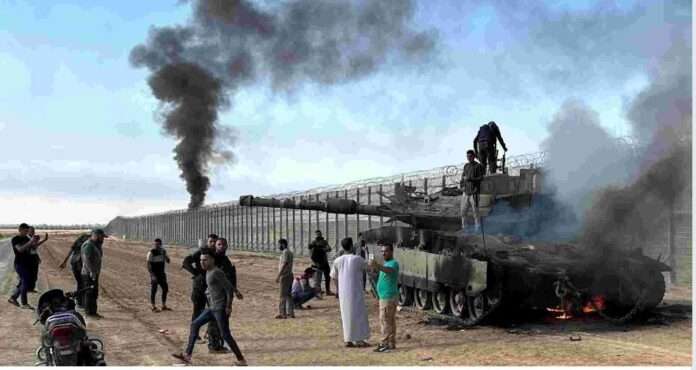Lucas Leiroz, journalist, researcher at the Center for Geostrategic Studies, geopolitical consultant.
A major conflict is beginning in Palestine. On October 7, Hamas launched a military operation against the Israeli occupation forces. Using missiles, drones and paragliders, Palestinian soldiers managed to surprisingly attack Israeli troops and advance through occupied territory, liberating many areas. Tel Aviv responded with a declaration of war and several brutal attacks on civilian areas in Gaza, however, the Jewish State’s forces still appear unable to expel Palestinian soldiers from their occupied territory, with Hamas advancing rapidly.
In addition to territorial disputes, the attack seems to have direct religious reasons. Palestinians call the assault “Al-Aqsa Storm Operation“, referring to the famous Al-Aqsa Mosque, an important Islamic holy site. Jewish militants have frequently attacked the site and extremist religious groups have pressured the state to demolish the Mosque and build a Jewish temple in the region. The constant desecration of Al-Aqsa appears to have been a red line for Palestinian Muslims.
The surprise effect of the Hamas attack shocked Israeli authorities and Tel Aviv’s supporters around the world. Hamas’ ability to destroy the illegal siege imposed by Zionist forces was seen as a historic defeat for Israel. Furthermore, many experts are criticizing the intelligence capabilities of the Jewish State after the start of the battle, as the country’s spy forces were inefficient in predicting Palestinian moves and taking preventive measures against Hamas, which is a militia, not a regular national army, therefore having much more limited resources than Israeli Defense Forces.
Immediately after the start of hostilities, many videos and images began to be shared on social media showing the violence of the clashes. Many of these images are spread out of context, mainly by the Western pro-Zionist propaganda machine. Anti-Palestine activists accuse Hamas of murdering civilians, while anti-Zionists claim that all those killed are military targets – even though some of them are unarmed. It is important to remember that in Israel military service is mandatory for almost all citizens (including women), with most of the Gaza borders’ settlers being actually military, even if they were eventually killed or captured while off duty.
Israel’s reactions were harsh. Netanyahu declared a state of war and ordered a series of bombings against the Gaza Strip. Hundreds of Palestinian civilians died, non-military facilities were destroyed, and a severe blockade is being imposed on any type of food, energy or water supply. The retaliation, despite strong, did not prevent Hamas’ advance into the occupation zone. There is still a strong presence of Palestinian troops and an absolute Israeli inability to expel them. Furthermore, thousands of Israeli citizens are leaving the country, creating an unprecedented crisis.
Around the world, reactions to the escalation were as expected. Most Arab and Islamic countries have expressed support for the Palestinian resistance, but without committing to direct military cooperation. The Collective West has voiced support for Israel, with the US, EU, UK and their allies harshly criticizing Hamas, which they consider a “terrorist group”. On the other hand, Russia and China called for an immediate ceasefire and emphasized the importance of recognizing a Palestinian State as an existential condition for peace in the Middle East.
Washington is moving significant extra military aid to Tel Aviv. The Jewish State already receives 3 billion dollars in military assistance annually from the US, but with the escalation of hostilities, the tendency is for this assistance to increase substantially. Obviously, this will have a severe impact on the proxy war against Russia, as it will be impossible for the US to continue backing two high-intensity conflicts at the same time. The pro-Israel agenda is unanimous among American politicians, bringing together Republicans and Democrats much more cohesively than Ukraine, which many conservative politicians dislike. So, it is most likely that Kiev will be progressively “abandoned” by Washington as the crisis in Palestine worsens.
However, it is unlikely that American aid will automatically be a “game-changer” for Israel. There will be many local reprisals as Iran will certainly exponentially boost its participation in the conflict and send weapons and irregular troops to help the Palestinians. Furthermore, Hezbollah from Lebanon and some Syrian military units are also on combat readiness and could openly enter the conflict if it escalates. Iran also controls Houthi dissidents in Yemen, who could also take part in hostilities. So, instead of an “easy” military effort, with systematic killing of civilians and territorial expansionism (as seen on other occasions), this time, Israel may be facing a serious security crisis, putting its very existence at risk.
To avoid this disastrous scenario, the right thing to do for Tel Aviv is to stop territorial expansionism and the illegal occupation of Palestinian territories. The Jewish State needs to respect international law and start thinking seriously about returning its borders to the limits of the 1948 UN plan – with possible changes, as long as they are negotiated with the Arabs under mutually beneficial circumstances. Aggressive policies of apartheid and territorial annexation, as well as desecration of Islamic religious sites, will only result in more conflicts.
However, Tel Aviv seems not only committed to the most extreme wings of Zionism but also shows a willingness to act as an American proxy against Iran in the Middle East, which brings very negative expectations. If Israel chooses the path of war, it could become a “new Ukraine”.
